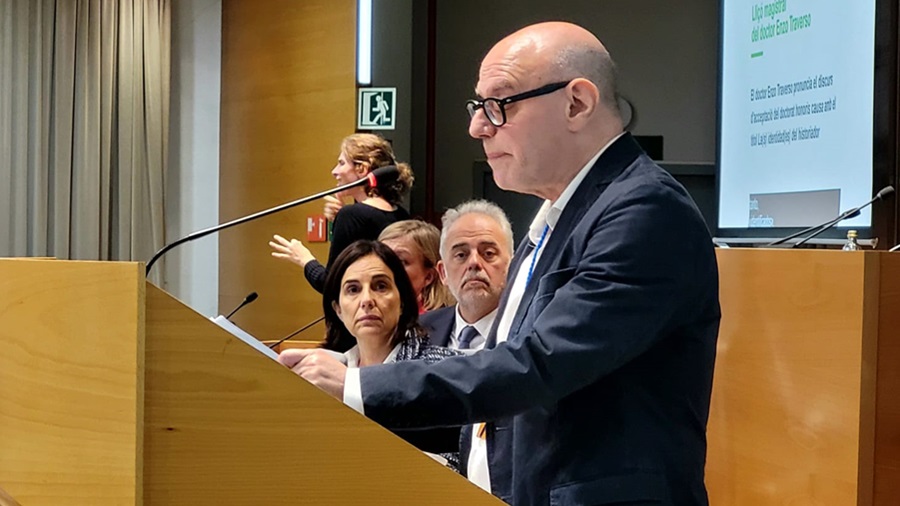The UAB pays homage to the civic and historiographic commitment of Enzo Traverso
Enzo Traverso, one of today's most renowned historians, was awarded an honorary doctorate today in a ceremony in which he gave a master lecture on the academic and civic tasks of historians. He also used the view on the history of Walter Benjamin to emphasise "an open process in which an unfinished past can reactivate itself, and thus break the continuum of a chronological history and break out in the present". UAB Rector Javier Lafuente praised him for the "civic and ethical commitment Traverso has with the present".

Traverso, holder of the Susan and Barton Winokur Chair of Humanities at Cornell University, spoke about “the identities of the historian” in a conference in which he paid tribute to his teachers: from his “formative influences”, among which he highlighted the names of Isaac Deutscher, Perry Anderson and Michael Löwy, to the leaders of the tradition he defends, such as Lucien Goldmann and Georges Haupt.
According to the Piedmontese historian, “there are different ways of being a historian; some are undoubtedly better than others, but there is no normative paradigm”. In his case, he emphasised the international dimension of his academic career (Traverso was born in Italy, lives in the United States, writes mostly in French and delivered his speech in Spanish) and listed the rules that have guided his work: contextualisation, historicism, comparatism and conceptualisation.
He also reflected on the meaning of belonging to a generation and defended the “sub-generation of the seventies”. As he defined it, it is “the last generation of October, the last that was formed around the conviction of the possibility of a socialist revolution in Central Europe” and, at the same time, “the first generation of researchers who were formed in a global world”.
According to Traverso, “the role of the historian is, above all, critical,” and a “good historian should not write to defend a cause or speak on behalf of a group.” Quoting Eric Hobsbawm, he affirmed that “historians do not write for proletarians, women, homosexuals, blacks or Jews; they write for everyone”. However, he added that “this universalism does not imply any axiological neutrality or indifference to the noise of the world”.
That is precisely why the UAB's new honorary doctor has never hidden his opinions and attempts to “analyse the new faces of fascism in the 21st century”. And he recalled that he recently wrote a monograph on the conflict in Palestine to “provide clarification against the abuse of memory and the manipulation of history that we have witnessed this past year to justify a war that bears traits of a genocide”.
Committed to "freedom, equality and justice"
Rector Lafuente closed the ceremony with a speech in which he congratulated Traverso for his master class, which, he said, “should be essential reading in our faculties". In the historian's work, said the rector, “past and present dialogue with the desire to contribute to the critical understanding of the society in which we live”. Lafuente valued that “Traverso's commitment to knowledge is a commitment to the values of freedom, equality and justice” and praised his “contribution to the social debate on issues that are often polarised: his reflection on the resurgence of the radical, racist and xenophobic right and his look at the Gaza conflict are good examples of this”.
Treverso's appointment as honorary doctor of the UAB was put forward by the Faculty of arts & Humanities, and professors Pere Ysàs and Francisco Morente of the Department of Modern and Early Modern History, were his sponsors. In their introductory speech before Traverso's conference, Professor Morente underlined “his commitment to truth and justice as a citizen and as an intellectual”.
The UAB, with Sustainable Development Goals
Quality education